Why would someone burn £5m of punk artefacts?
- Published
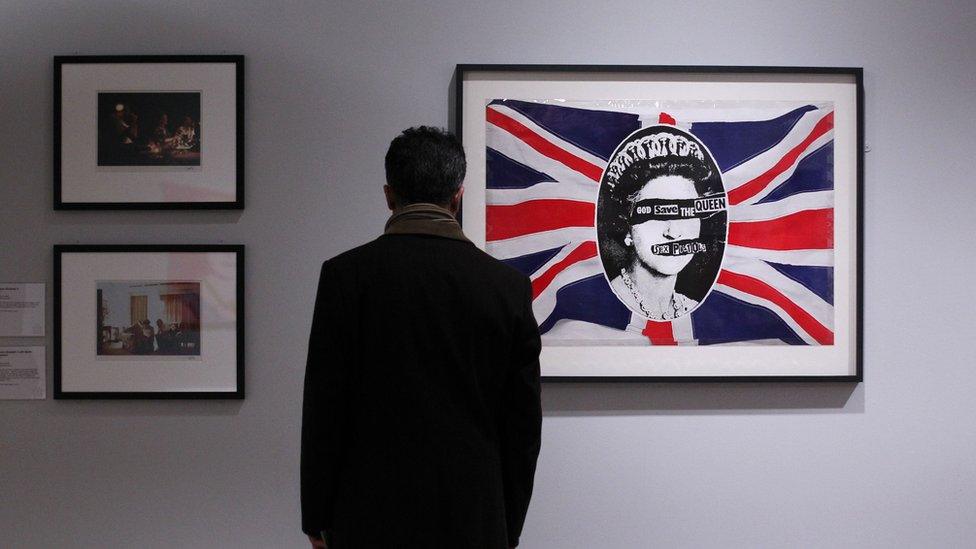
The son of the manager of the Sex Pistols says he is planning to burn punk memorabilia worth £5m in protest against some of the celebrations commemorating 40 years since the band's breakthrough. Why?
"I don't have any heroes. They're all useless," said Johnny Rotten in 1976. "I don't accept the old order. Get rid of it."
The rise to prominence of the Sex Pistols during that hottest of 20th Century summers created uproar, genuine and manufactured, in the popular press, with stories of bottle-throwing, spitting and fist-fights at gigs. As their fame grew, Rotten - real name John Lydon - and his bandmates faced cancellations and protests, with one demonstrator in Caerphilly reportedly likening them to the spawn of Satan.
It's 40 years since punk, a cultural movement which rejoiced in anarchy and chaos, hit the UK's popular consciousness. Now a year-long programme of concerts, exhibitions and films in London will "look back at the excitement and energy" of the time and punk's role as an "ongoing catalyst that continues to inspire, refuse categorisation and spark creativity around the world".
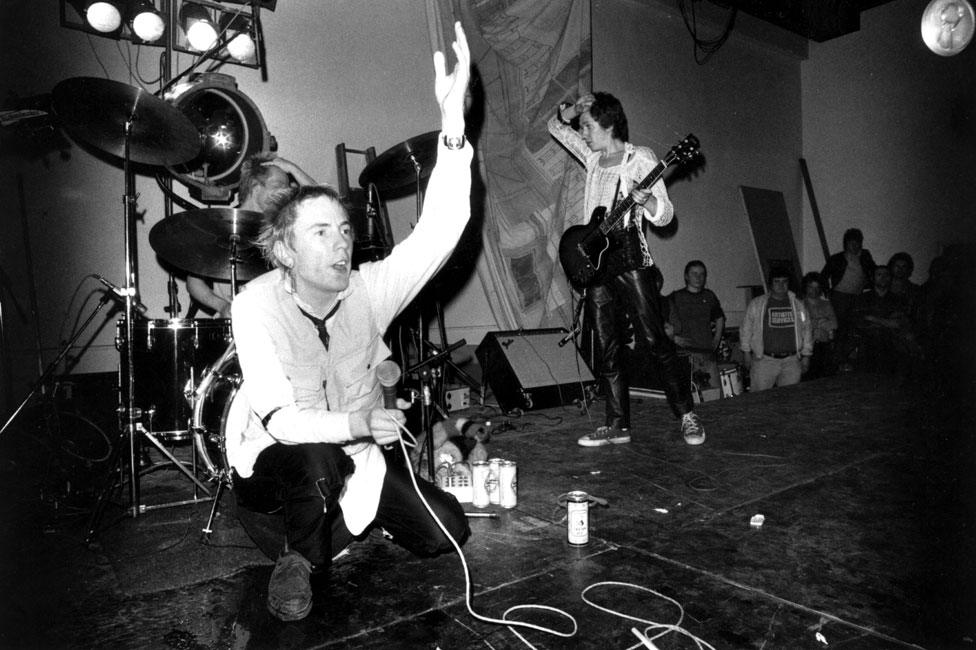
1976: Sex Pistols in concert at Leeds Polytechnic
"Always more than a musical genre, punk allowed a generation to express themselves without deference," say the organisers, "to invent without fear, and to create without boundaries."
Joe Corre is the son of the band's manager Malcolm McLaren and the fashion designer Vivienne Westwood, who provided the Sex Pistols with their stage gear. He isn't happy about the idea of punk-celebration events at establishment venues such as the British Library and the British Film Institute, using a £99,000 Lottery Fund grant. An anti-establishment force is being "appropriated by the mainstream", external and turned into a "tribute act", he has complained.
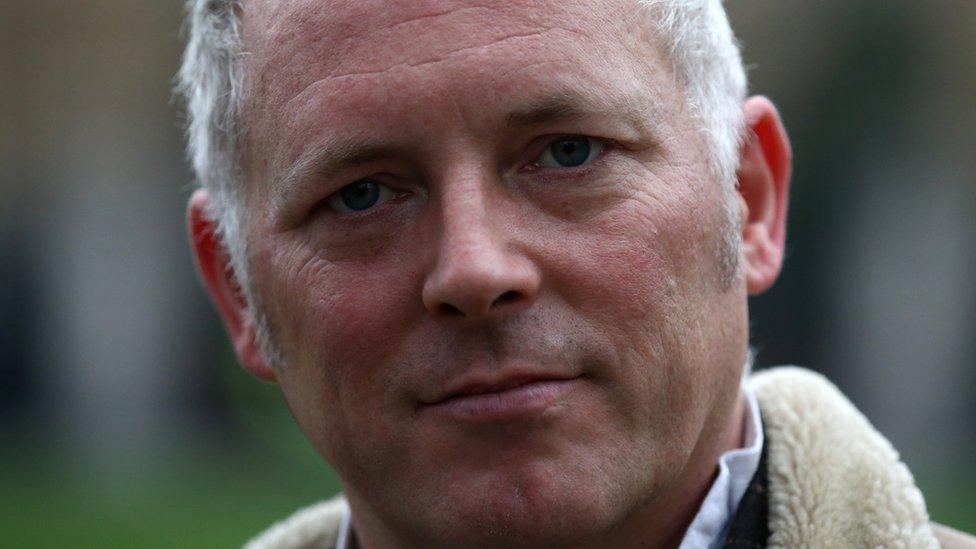
Joe Corre believes punk has been appropriated into the mainsteam and turned into a "tribute act"
He's promising to burn his £5m punk memorabilia collection, containing "vast amounts" of clothing from the period, including leather trousers, ripped jeans and T-shirts depicting full-frontal nudity, in protest. Some might think this is a publicity stunt, but he insists he's serious.
"The Queen giving 2016, the Year of Punk, her official blessing is the most frightening thing I've ever heard," Corre, co-founder of the lingerie retailer Agent Provocateur, said in a statement (although the Queen is not actually thought to have given the exhibition, Punk London, her personal backing).
The Sex Pistols' lifespan was brief but eventful. A series of gigs in 1976 - the best known at Manchester's Lesser Free Trade Hall in June - made them famous, and infamous. The record label EMI signed them in the autumn.
In November, an interview with Bill Grundy on Thames TV's Today programme, external ended with band member Steve Jones swearing at the presenter. EMI sacked the band early in 1977, citing "adverse publicity". They later signed with Virgin Records.
Corre's decision to burn his memorabilia has "several levels of irony", says David Nolan, author of I Swear I Was There, a book about the Free Trade Hall gig. "It's ridiculous how we fetishise a band that was actually formed in a fetish clothes shop," he suggests. "Some people hold on to old T-shirts and posters from the era that weren't meant to last more than a weekend."
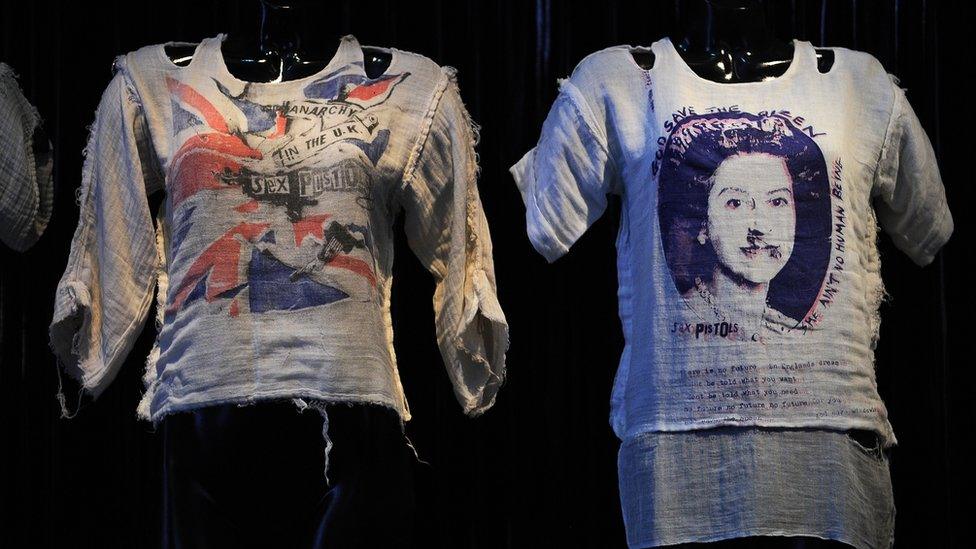
Vivienne Westwood's punk t-shirts on display in a museum exhibition in New York
The burning is scheduled to take place in Camden Town, north London, in November, the 40th anniversary of the release of the Sex Pistols' first single, Anarchy in the UK. McLaren, who as well as being Corre's father, was a gifted promoter and salesman, "would have been proud", Nolan says.
Music journalist Paul Stokes agrees it "is a massively punk thing to do. It's interesting, in a year when punk is being celebrated as a cultural institution, to be reminded of its nihilism and that it was a rejection of what had gone on before." He says it seems odd treating this genre with the same reverence for the past that punks openly despised. But it is fully deserving of this level of respect, says Stokes, creating what he calls a "punk paradox".
But Dave Haslam, author of Not Abba: the Real Story of the 1970s, doubts whether Corre's destruction of artefacts is worthwhile.
"Given the power of big business now and the pressures on young people to conform and to acquiesce - much bigger than in the 1970s, I think - surely we want future generations to learn and to be inspired by punk's call to arms , to challenge rather than just to accept, to participate rather than just to consume," he says.
"And if we do, then these items are crucial. I think there are so many other ways a protest against the commercialisation of punk could be made without such a destructive act."
One alternative Haslam suggests for Corre is to sell the memorabilia to fund literacy programmes or to help develop young creative talent.
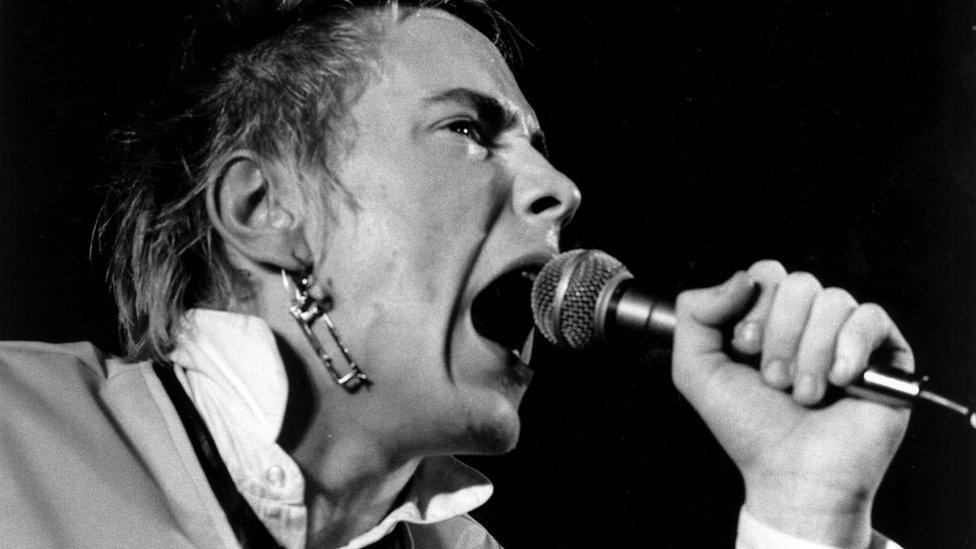
John Lydon in 1976.
"Punk was about empowerment," he says. "I met John Lydon last year. I said to him: 'The generation before mine had the Beatles, Carnaby Street, Woodstock, all that 60s stuff, and there was a sense that my generation had missed, but we had the Pistols and punk. It opened all the doors. It helped us build our own culture, our own lives.'"
The Sex Pistols broke up in 1978, the year in which Sid Vicious, who had joined in 1977, was accused of murdering his girlfriend, Nancy Spungen. Vicious died of a drug overdose, external in February 1979, while on bail.
The band reunited briefly in 1996, 2003 and 2007. They were inducted into the Rock and Roll Hall of Fame in 2006 but refused to attend the ceremony.
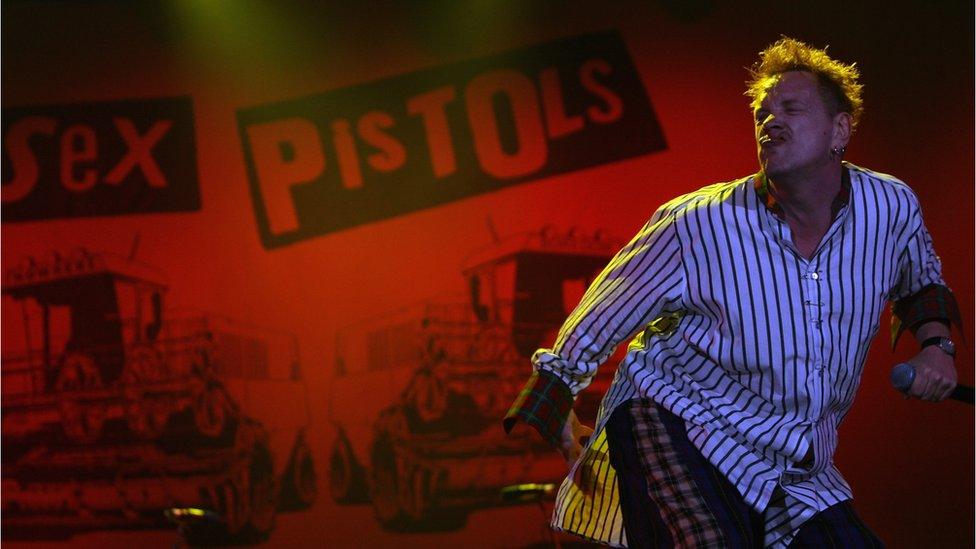
... and in 2008 at a Sex Pistols reunion gig
"What Joe Corre is doing is brilliant," says David Nolan. "If he's going to upset the sort of people who get upset over this sort of thing, great. I wouldn't be surprised if all this is exposed as a stunt - a way to rouse people's anger. If that's the case, it's even better."
Follow Justin Parkinson on Twitter @justparkinson, external
Subscribe to the BBC News Magazine's email newsletter to get articles sent to your inbox.